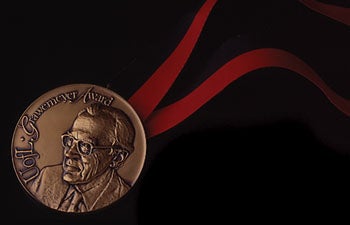Improving World Order
A book about nuclear proliferation by Jacques Hymans, associate professor of international relations at USC Dornsife, has won the 2014 Grawemeyer Award for Ideas Improving World Order. A $100,000 prize is attached to the award.
This is the third major award the book has received. The two others are the American Political Science Association’s 2013 Don K. Price Award and the National Academy of Public Administration’s 2013 Louis Brownlow Book Award.
Hymans’ book, Achieving Nuclear Ambitions: Scientists, Politicians and Proliferation (Cambridge University Press, 2012) analyzed nuclear weapons projects started by repressive regimes and how they were often prone to inefficiency and failure, due in large part to heavy-handed management. These failed programs often had unrealistic timetables and put undue pressure on scientists, resulting in years of wasted money and effort. The book notes that even successful programs have met with considerable delays and challenges, and the difficulty of these programs seems to increase over time.
Among the book’s implications is that the United States and international analysts should consider these internal obstacles before rushing into military action or high-stakes negotiating.
“I’m very grateful and pleased that the book seems to be striking a chord,” Hymans said. “For years, the conventional wisdom in Washington has been that the world is on the verge of a generalized nuclear free-for-all . . . overreactions to a phantom threat can be extremely costly.”

H. Charles Grawemeyer, industrialist, entrepreneur, astute investor and philanthropist, created the Grawemeyer Awards to help make the world a better place. The University of Louisville, Kentucky, gives out the award, which includes $100,000.
Hymans said those negotiating with Iran should take heed. Despite saber-rattling that has enveloped discussion around a recent nuclear deal, Iran’s program has so far been very inefficient. What progress has been made has come after decades of work, similar to programs in Iraq, Libya and North Korea.
“Negotiate with care, but also with confidence,” Hymans said. “Even if the current talks break down, an Iranian nuclear weapons breakout is not imminent. At the same time, if there is a reasonable deal on the table, take it.”
He said that fears over Tehran secretly violating its obligations in the deal are somewhat exaggerated; the country’s track record indicates its nuclear development work wouldn’t get far before the violation came to light.
“The nightmare scenario is just that: a bad dream,” Hymans said.
Hymans is currently in Japan studying the country’s nuclear infrastructure and policies, particularly in the wake of the 2011 Fukushima disaster. Funded by a Mellon fellowship, he hopes to better understand the political and technical challenges facing Japan’s nuclear industry, which is a critical power source for the country.
“Long before the tragic earthquake and tsunami, Japan’s nuclear efforts were already bedeviled by technical malfunctions and political gridlock,” Hymans said. “Now more than two years later, the country’s huge nuclear infrastructure remains in limbo. It’s an exciting challenge to work out the complex interaction of political vectors in one of the world’s biggest economies.”
University Professor Antonio Damasio, who proposed that emotions play an integral role in human reasoning and decision-making, has won the 2014 Grawemeyer Award for Psychology.